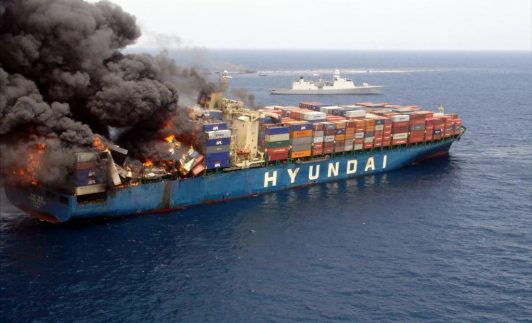WHY INSURE?
Shipments in transit are subjected to numerous perils.
Goods may be damaged in a storm or fire, stolen, involved
in a collision or just mishandled. To protect against financial
loss, consider obtaining Shipper’s Interest Cargo Insurance.

In addition to covering loss or damage, Cargo Insurance also protects against General Average, pays for the costs to minimize a loss (sue and labor), and pays for damage inspection (survey). Carriers also have limited liability and are provided legal defenses which absolve them of responsibility entirely. Cargo Insurance pays covered claims without the need to prove fault. Why not insure?
WHAT IS GENERAL AVERAGE?
General Average is a concept incorporated into most
ocean bills of lading. It is used when a voluntary sacrifice
is made to save the vessel, cargo or crew from a common
peril (e.g., jettison of cargo to extinguish a fire). If the
sacrifice is successful, all parties contribute to the loss
based on their cargo’s value. If the cargo isn’t insured,
it won’t be released until the shipper posts a guarantee
(cash, bank guarantee or bond). If the cargo is insured,
the insurance company will handle all arrangements on
the shipper’s behalf.
WHAT ABOUT CARGO THEFT?
Estimates of cargo theft in the United States range from $25-$50 billion annually. Officials estimate that nearly 80% of cargo thefts involve collusion of employees. Drivers are often paid to leave their truck unattended at a specific place and time.
Statistics
• Within 24 hours of theft: The goods are already
delivered to an alternate location. Thieves are
no longer in possession of the merchandise.
• Within 48 hours of theft: Cargo is split into
about five consignments and distributed.
• Within 72 hours of theft: Goods are being
marketed and sold.
HOW ARE CARRIERS LIABLE?
Carriers do not pay claims unless they directly cause
or contribute to the loss. Even when carriers are legally
liable for loss or damage, however, the amount they will
pay is limited based on the mode of transport.
Ocean
The Carriage of Goods by Sea Act (COGSA) governs carrier liability for goods shipped via ocean to/from the United States. Recovery is limited to $500 per customary freight unit, and only when the carrier is negligent. A “freight unit” can vary from one container to one pallet.
International Air
For air carriers, two liability conventions exist. The Warsaw Convention limits liability to $9.07 per pound or $20 per kilogram. The Montreal Convention (used in the United States), changed this limitation to 19 Special Drawing Rights (SDRs), or about $30 per kilogram.
Domestic
Many domestic air, intrastate road carriers and warehouse operators limit their liability to $0.50 per pound or $50 per shipment, based on their bill of lading or warehouse receipt. Interstate truckers are governed by the Carmack Amendment, which dictates full value, but allows for limitations of liability in bills of lading, tariffs or contracts. Some carriers will also have inadequate or no liability insurance and may be unable to fund a loss out of pocket.

CARGO INSURANCE COVERAGE OPTIONS
We can offer comprehensive “All-Risk” coverage for cargo in transit, including Free of Particular Average and With Average alternatives.
• “All-Risk”: Provides the broadest form of protection available. Goods are covered for loss or damage without the need to prove liability. An easy way to remember “All-Risk” coverage is “everything is covered, except what is excluded.” Typical exclusions include improper packing, inherent vice or rejection of goods by Customs.
• Free of Particular Average (FPA): Offers less protection than “All-Risk” coverage, but is a good option for commodities like used goods, waste materials and scrap metal. A good way to remember FPA coverage is “the only covered losses are specifically named.” Perils covered under FPA include: sinking, collision, General Average, fire and washing overboard, to name a few.
• With Average (WA): Extends FPA to cover heavy weather. Many shippers choose to add theft, pilferage and nondelivery to WA and FPA.
DECLARED VALUE VS. CARGO INSURANCE
Declaring value to a carrier is not the same as Cargo Insurance. To claim against a carrier, the shipper must prove that the cargo was damaged in the carrier’s care, custody or control. The carrier then has multiple defenses to prove they weren’t liable, which makes recovery difficult. Cargo Insurance provides protection without having to prove carrier liability. This is particularly important in instances where a loss is attributable to an “Act of God.” The following sample claims illustrate the difference between declaring value and Cargo Insurance:
| DESCRIPTION OF LOSS | DECLARED VALUE FOR CARRIAGE | CARGO INSURANCE |
|---|---|---|
| While a trucker was en route, the truck was struck by lightning. The lightning caused a fire and resulted in a total loss to the cargo. |
Even if a value is declared, there would be no automatic right of recovery because the trucker did not act negligently. The loss was considered an “Act of God.” |
This type of claim would be paid under “All-Risk” Cargo Insurance coverage. |
| Several days after an ocean vessel left the port, it ran into heavy weather. A large wave hit the vessel and containers were washed overboard. |
“Heavy Weather” is excluded under COGSA. The ocean carrier would deny liability and no payment would be forthcoming. |
This type of claim would be covered by “All-Risk” Cargo Insurance as well as WA coverage. |
